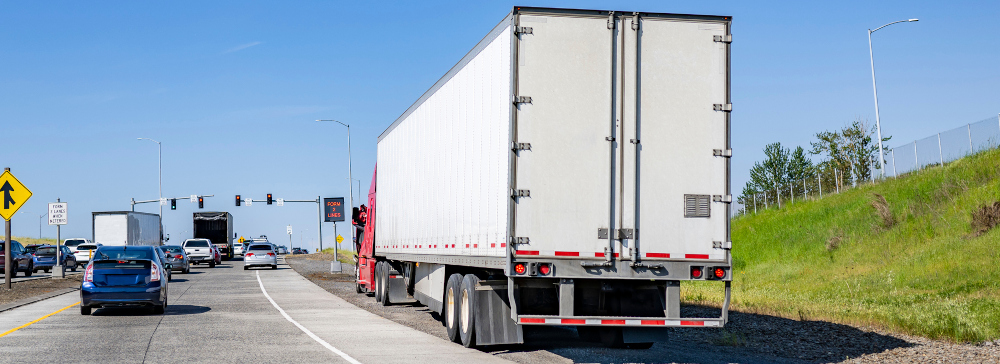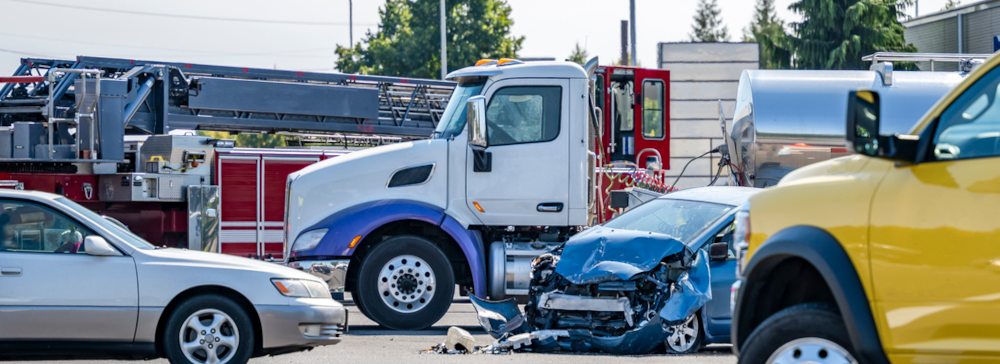Houston’s highways and industrial corridors are essential routes for semi-trucks, 18-wheelers, and other large commercial vehicles transporting goods across Texas. Given the disparity in size with passenger vehicles, catastrophic brain injuries and spinal cord damage are common after a truck accident. Injured victims, or their families in fatal accidents, may be able to file an insurance claim to recover their losses.
If this has happened to you, a personal injury lawyer in Houston from D. Miller & Associates, PLLC® can help. We can evaluate your legal options, guide you through every stage of your truck accident claim, and advocate for the full compensation you are entitled to under the law.
Contact us today for a free consultation with our legal team.
Why Choose D. Miller & Associates, PLLC® after a Truck Accident in Houston?

With 66+ years of combined experience, more than 36,000 cases won, and over $650 million in verdicts and settlements for injured clients, our truck accident law firm has built a strong reputation for delivering results. Our team of 83 dedicated professionals works tirelessly to provide compassionate, client-focused support, and we want to help you pursue justice.
We have received several awards and honors that reflect our commitment to excellence and client satisfaction, including:
- Small Business Community Association – Excellence Award
- The National Trial Lawyers – Top 100
- American Institute of Personal Injury Attorneys – 10 Best Award for Client Satisfaction, 2017-2018
They underscore our dedication to providing exceptional legal representation and our ongoing commitment to serving our clients with integrity and professionalism.
Truck Accidents Are Alarmingly Common in Houston

Houston’s roadways are among the most dangerous in the nation, with truck accidents contributing to the city’s high crash rates. The Texas Department of Transportation (TxDOT) reports that it consistently leads the state in total traffic accidents; 250,489 persons were injured in motor vehicle traffic crashes in 2023.
Key Factors Contributing to High Truck Accident Rates in Houston:
- Heavy Traffic Congestion. Houston’s extensive highway system, including major corridors such as I-10 (Katy Freeway), I-45 (Gulf Freeway), and Beltway 8 (Sam Houston Tollway), carries some of the highest traffic volumes in the state. The constant congestion increases the risk of collisions, particularly where large commercial trucks operate in close proximity to passenger vehicles.
- Concentration of Industrial and Freight Activity. Houston experiences significant commercial truck traffic, particularly around the Port of Houston. The steady movement of freight and industrial equipment adds to roadway stress and increases the risk of crashes.
- Infrastructure and Design Limitations. While Houston’s road network is designed for high-capacity transportation, certain stretches, especially older interchanges and industrial corridors, lack the structural features necessary to safely accommodate a mix of heavy trucks and commuter traffic. Tight curves, narrow lanes, and limited merge areas in some industrial zones contribute to increased collision risk, especially near port terminals and distribution centers. In addition to freight traffic around ports and industrial areas, substantial numbers of delivery vans, moving vans, and other commercial vehicles use Houston’s roadways – including in residential areas – to deliver their cargo.
Port of Houston Truck Accidents

Houston’s status as a major freight hub, anchored by the Port of Houston, makes the city a focal point for commercial truck traffic. We prioritize cases involving truck accidents connected to port operations due to the heightened risks and complex liability issues these cases present.
Elevated Risks for Port-Related Truck Accidents
Trucks transporting cargo to and from the Port of Houston face unique operational pressures that increase the likelihood of serious collisions. Common contributing factors include:
- Improperly loaded or shifting cargo, which can destabilize the vehicle
- Time constraints and scheduling pressure, which may lead to driver fatigue or unsafe driving practices
- Overweight or unbalanced freight, increasing the risk of rollovers or brake failure
Key Freight Routes and High-Risk Corridors
Several major highways and freight corridors serve the Port of Houston, creating high-density truck traffic zones. Notable routes include:
- State Highways 225 and 146
- I-610 East Loop
- Interstate 10 (I-10)
- Beltway 8 / Sam Houston Tollway
These routes are frequently congested, often with close proximity between commercial vehicles and passenger cars, increasing the risk of multi-vehicle collisions.
Local Hotspots for Truck Accidents Near the Port
Truck accidents commonly occur in areas surrounding major port terminals, where traffic volume and maneuvering challenges are highest.
Key locations include:
- Barbours Cut Terminal
- Clinton Drive
- Manchester Terminal
- Jacintoport Boulevard
- Turning Basin Terminal
Establishing liability requires a thorough investigation into the circumstances, location, and contributing factors of the accident. Our firm is well-equipped to analyze these complexities and pursue all avenues of recovery to secure full and fair compensation for our injured clients.
Common Causes of Truck Accidents in the Houston Area

Many truck accidents result from lapses in federally and state-mandated safety protocols, driver negligence, or non-compliance with industry regulations. The Federal Motor Carrier Safety Administration (FMCSA) and the Texas Department of Public Safety (DPS) establish and enforce standards governing commercial vehicle operation, including hours-of-service limits, vehicle maintenance, cargo securement, and driver qualifications.
When these standards are disregarded by drivers, carriers, or other parties, the risk of serious accidents increases substantially.
The following are some of the most frequent causes of truck accidents:
Driver Fatigue and Hours-of-Service Violations
Under federal law, commercial drivers are subject to Hours-of-Service (HOS) regulations established by the Federal Motor Carrier Safety Administration (FMCSA), which set strict limits on driving time and mandate rest periods to reduce the risk of fatigue-related accidents.
Violations of these rules, such as exceeding maximum driving hours or falsifying logbooks, can impair a driver’s alertness, reaction time, and decision-making ability. In personal injury litigation, documented HOS violations may serve as compelling evidence of negligence or regulatory non-compliance by the driver or carrier.
Distracted or Reckless Driving
Distracted driving, including texting, eating, or adjusting vehicle controls, poses a significant hazard, especially in commercial trucking. Under federal regulations enforced by FMCSA, commercial drivers are expressly prohibited from texting or using handheld mobile phones while operating a commercial motor vehicle. Violations may result in substantial fines and serve as evidence of regulatory non-compliance in a civil claim.
Reckless behaviors such as excessive speeding, unsafe lane changes, and failing to signal or yield the right of way also contribute to truck accidents. These actions violate state traffic laws and may demonstrate a breach of the standard of care required under Texas negligence law, potentially supporting liability in a personal injury case.
Improper Cargo Loading and Securement
FMCSA has established detailed rules on securing cargo to prevent load shifts that could destabilize a truck during transit. In such cases, liability may extend beyond the driver to include loading personnel, carriers, or third-party logistics providers responsible for cargo handling and securement.
Failure to comply with FMCSA regulations is strong evidence of negligence in personal injury claims and may support a finding of fault and damages.
Mechanical Defects and Inadequate Maintenance
Under federal and state regulations, commercial motor carriers are legally obligated to maintain their vehicles in safe operating condition. FMCSA requires routine inspections, maintenance, and repairs to ensure vehicle safety. Failures to adhere to these maintenance standards, such as neglecting brake inspections, tire replacements, or steering system repairs, can result in critical mechanical defects.
When mechanical problems lead to a crash, responsibility may fall on the trucking company, repair shop, or other parties if they failed to meet required safety standards or did not properly maintain the vehicle.
Impairment Due to Drugs or Alcohol
Operating a commercial motor vehicle while under the influence of alcohol or controlled substances is a serious violation of both federal and Texas state law. FMCSA sets a lower blood alcohol concentration (BAC) limit for commercial drivers, 0.04%, and mandates drug and alcohol testing.
Evidence such as toxicology reports, breathalyzer results, and compliance with post-accident testing protocols often plays a critical role in establishing liability.
Adverse Road and Environmental Conditions
External factors such as inadequate lighting, deteriorated road surfaces, high-traffic industrial zones, and insufficient traffic control measures can significantly elevate the risk of commercial vehicle accidents.
When these conditions are present, particularly in dense traffic areas like Houston’s industrial corridors, they can contribute to or exacerbate the severity of a crash. In these cases, liability may extend beyond the driver or carrier to include government entities or contractors responsible for roadway design, maintenance, or traffic management.
Meet Your Legal Heroes
Behind every case stands a team of dedicated legal heroes, ready to take on the insurance companies and fight for the compensation you deserve.
Who Can Be Held Liable in a Houston Truck Accident Claim?

As noted, liability in commercial truck accidents often extends beyond the individual driver. Thoroughly identifying all potentially liable parties is essential to pursuing full and fair compensation:
The Truck Driver
If the driver engaged in negligent behavior, such as distracted driving, excessive speed, operating while fatigued, or under the influence, they may be held directly liable for the accident.
The Trucking Company
Under the doctrine of respondeat superior, a trucking company may be held vicariously liable for the negligent actions of its driver if those actions occurred within the scope of employment.
Beyond vicarious liability, the company may also face direct liability for its own negligent conduct, including inadequate driver training or supervision, failure to enforce safety protocols, pressuring drivers to violate Hours-of-Service regulations, or neglecting required vehicle maintenance. Such failures can create foreseeable hazards that significantly increase the risk of serious accidents.
Maintenance and Repair Providers
Liability may also extend to third-party maintenance or repair providers when a mechanical failure contributes to a collision. They may be held partially or fully liable for the resulting accident if they did not perform the required inspections, used substandard parts, or negligently conducted repairs.
Manufacturers and Parts Suppliers
If a defect in the truck or one of its components caused or contributed to the accident, the manufacturer or parts supplier may be held liable under the doctrine of strict liability.
In these cases, it is not necessary to prove direct negligence; liability may arise from distributing or selling an unreasonably dangerous product due to a design flaw, manufacturing defect, or inadequate warning.
Cargo Loaders and Logistics Companies
If freight shifts during transit due to improper loading, inadequate securement, or failure to comply with applicable safety standards, the party responsible for those tasks, whether a third-party logistics provider, freight handler, or shipping contractor, may be held liable for resulting accidents.
How Federal and Texas Trucking Laws Affect Your Case

Several key regulations may influence the outcome of a truck accident claim:
- Federal Motor Carrier Safety Regulations (FMCSR): As noted, these federal rules govern driver qualifications, hours-of-service limits, vehicle maintenance, and cargo securement. Violations can serve as strong evidence of negligence.
- Texas Transportation Code: State-specific provisions address weight limits, hazardous materials transport, and commercial licensing, which may be relevant in establishing liability.
- Recordkeeping Requirements: Carriers must maintain logs, inspection reports, and maintenance records; documents that can be critical to proving fault and regulatory non-compliance.
- Insurance Requirements: Commercial trucking companies are subject to higher minimum insurance limits, which may affect the compensation available to injured parties.
Compliance or violation of these regulations can significantly affect your case by helping establish liability, determining available insurance coverage, and shaping the scope of recoverable damages.
“The concept of loss is often tied to identity. What may be a devastating loss for one person may be a tolerable inconvenience for another. The difference lies in how each of us sees himself and what each of us values in life.”
What to Do After a Truck Accident in Houston
Following a serious truck accident, your priority should be seeking immediate medical attention to address any injuries and ensure your safety. Once your condition is stable, the decisions you make in the hours and days that follow can significantly affect both your recovery and your ability to pursue compensation:
- Seek Immediate Medical Attention. Call 911 or go to the nearest emergency room, even if injuries are not immediately apparent. Prompt medical treatment ensures proper care and creates a crucial medical record linking your injuries to the accident.
- Contact Law Enforcement and Ensure a Police Report Is Filed. A police report provides an official account of the crash and may include witness statements, initial fault determinations, and documentation of the scene. Request a copy for your records.
- Document the Scene and Your Injuries. If you can, take photos or videos of the accident scene, vehicle damage, road conditions, and any visible injuries. This evidence can be critical in establishing liability and damages.
- Gather Contact Information from Witnesses. Independent eyewitness accounts can support your version of events. Obtain names, phone numbers, and any relevant details while still at the scene.
- Avoid Making Statements to the Trucking Company or Insurers. Insurance adjusters may contact you shortly after the crash. Do not provide recorded statements or accept any settlement offers without legal advice, as these can be used to limit your compensation.
- Preserve All Medical and Expense Records. Maintain thorough documentation of medical visits, treatments, prescriptions, lost wages, and out-of-pocket expenses. These records are essential for calculating the full extent of your damages.
- Contact an Experienced Truck Accident Attorney. Legal representation is critical in cases involving commercial carriers and complex liability issues. An attorney can manage communications, preserve evidence, and advocate for your right to full compensation under Texas law.
What Damages Can You Recover After a Houston Truck Accident?

The types and extent of damages available in a truck accident claim will vary based on the facts of the case, including the nature and severity of the injuries, the degree of long-term impairment, and the psychological and financial impact on your life.
Economic damages in Texas may include compensation for measurable financial losses:
- Emergency medical care, hospitalization, and surgical intervention
- Rehabilitation, physical therapy, and prescribed medications
- Medical equipment and necessary modifications to the home or vehicle
- Lost wages and loss of employment benefits during recovery
- Diminished earning capacity due to long-term or permanent impairment
- Property damage, including repair or replacement of the vehicle and personal items
- Costs associated with in-home care or assistance with daily living
Non-economic damages may include compensation for intangible losses such as:
- Pain and suffering: Compensation for physical discomfort and emotional distress resulting from the injury.
- Emotional distress and mental anguish: Covers psychological effects such as anxiety, depression, or trauma stemming from the accident.
- Loss of enjoyment of life: Recognizes limitations on the victim’s ability to engage in hobbies, recreation, or daily activities previously enjoyed.
- Scarring and disfigurement: Addresses the long-term impact of visible injuries on a person’s appearance and self-esteem.
- Loss of independence or quality of life: Compensates for significant lifestyle changes or loss of autonomy due to permanent injuries.
Punitive damages are awarded in rare cases where the defendant’s conduct is found to be especially egregious, such as involving gross negligence, willful misconduct, or reckless disregard for the safety of others. Unlike compensatory damages, which aim to make the victim whole, punitive damages are intended to punish the wrongdoer and deter similar conduct in the future.
How Our Houston Truck Accident Attorneys Build a Strong Case

We never want our clients to feel like just another case file on a desk. We promise you will never be pushed aside when you work with our firm. We take pride in tailoring our legal services to suit your unique situation, and never apply a one-size-fits-all approach to a case.
The following outlines how we build a compelling case to pursue the full compensation you are entitled to under the law:
- Comprehensive Evidence Collection is essential to proving fault in a truck accident case. This may include obtaining police reports, data from the truck’s electronic control module (ECM), commonly known as the black box, which records speed, braking, and other key vehicle functions, along with driver and company records, witness statements, and available video footage from dash cams, surveillance systems, or traffic cameras.
- Determining Liability involves reviewing the trucking company’s safety and maintenance records, evaluating compliance with federal and state regulations, and identifying violations such as driver fatigue, improper cargo loading, or mechanical defects. These findings are critical to establishing fault and supporting your legal claim.
- Retain Expert Witnesses: Our firm retains qualified expert witnesses, including accident reconstruction specialists, medical professionals, and economic analysts, to help establish liability, demonstrate causation, and accurately assess the full extent and long-term financial impact of your injuries.
- Insurance Negotiations and Litigation Strategy: Our firm handles all communications and negotiations with insurance carriers to protect your legal rights and to counter settlement offers that undervalue your claim. If a fair resolution cannot be reached through negotiation, we are fully prepared to initiate formal litigation and advocate on your behalf in court to pursue the full compensation available under the law.
Finally, whether you need to call or email us, we make it a point to contact you whenever you need. We are here to help, so feel free to come to us with any questions or concerns you may have as your case progresses.
Our Previous Clients’ Testimonials Speak Volumes
Nothing speaks louder than client testimonials, and we have our share of satisfied clients. You don’t have to take it from us; they can explain what it is like working with our truck accident lawyers in Houston, TX. Take a look at what they had to say about our firm:
- “I have been represented by D. Miller & Associates, PLLC for almost a year and I have nothing but positive things to say. The people there are always friendly and do their best to answer any questions to the best of their ability. I would strongly recommend this firm for any of your personal injury or any other claims you may have.” – Wayne Peacock
- “The staff here are genuinely concerned about what is going on in our lives. They have walked me through every step and I sincerely appreciate their helpfulness.” – Shelley Flynt Bradley
- “Everytime I’ve called they have been very courteous and attentive. They also answered all my questions I had regarding my case and made me feel like they truly care about my claim. Even though my case is still pending I know I will go to them for any other legal issues I may have in the future.” – Adrianne Frencl
We are proud to have served accident victims across Texas, and now we want to put our resources to work for you and your family.
How Long Do I Have to File a Truck Accident Lawsuit in Texas?

The statute of limitations sets a firm legal deadline for filing a truck accident lawsuit. In Texas, you generally have two years from the accident date to initiate legal action. Failure to file within this period will likely result in the court dismissing your claim, regardless of its merits. To preserve your right to seek compensation, it is critical to begin the legal process as early as possible.
Important Local Resources for Houston Trucking Accidents
Access to official records and legal filings is often essential for those involved in personal injury claims. The following Houston-area agencies provide important services related to court proceedings and accident documentation:
- Harris County Civil Courthouse
201 Caroline St, Houston, TX 77002
https://www.cclerk.hctx.net/Civil.aspx - Houston Police Department – Records Division
1200 Travis St, Houston, TX 77002
https://www.houstontx.gov/police/divisions/records/index.htm.
Speak With a Houston Truck Accident Lawyer About Your Case

If you or someone you love has been harmed in a truck accident, you deserve clear answers and the chance to hold those at fault fully accountable. Our attorneys will handle every detail, advocate for your interests, and fight for your right to recover compensation for your losses. Contact us today for a free, confidential consultation with a dedicated Houston personal injury lawyer. We are ready to help you take the next step.
Related Frequently Asked Questions
- Are Truck Accident Claims More Difficult Than Car Accident Claims?
- How Can I Prove Negligence in a Truck Accident Case?
- Should I Call the Police After My Truck Accident?
- What Does it Cost to Hire an Attorney in a Truck Accident Case?
- What Should I Do if the Trucking Company Contacts Me After My Accident?


